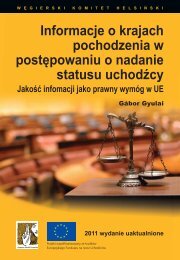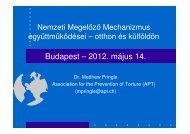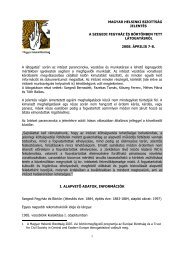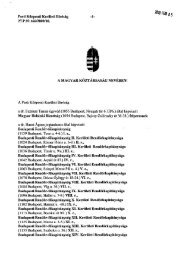English
English
English
Create successful ePaper yourself
Turn your PDF publications into a flip-book with our unique Google optimized e-Paper software.
Basic Standard The Compulsory Use of COIIt is the duty of the administrative body to assess the available evidence on the situation inthe country of origin [...]. In order to obtain evidence, it can make use of the diplomaticor consular personnel, the computer database of the UNHCR, where a large range ofinformation regarding the observance of human rights in individual countries is available orit can query a supranational organisation specialised in the protection of human rights.This standard, reiterated in CZ-02 the same year, is particularly interesting notonly for predating most European jurisprudence dealing explicitly with COI issues butalso for clearly designating the administrative decision-making body as responsible forcollecting country information. The relevant judgment of the Regional Court of Brno(CZ-16) also set a clear-cut and generally applicable standard:The defendant is to collect the information on country of origin of the asylum-seeker in thecourse of asylum proceedings.The above rule was further elaborated in a more recent judgment of the SupremeAdministrative Court (CZ-09), which pointed out that[...] [it is the administrative authority’s] task to put the reasons alleged by the asylum-seeker[...] to the precise framework of the reality of Nigerian society.and later refers to the lack of documented evidence as an obstacle to take a correctdecision. In CZ-19 the Supreme Administrative Court provided further justificationabout why administrative authorities shall collect and use COI:The principle according to which the administrative authority shall act in such a way as toascertain the facts of the case are free of any unreasonable doubt has specific features in theasylum proceedings due to the usual insufficiency of evidence that could prove the credibilityof the applicant’s allegations. It is, however, up to the administrative authority to prove orrefute the veracity of the applicant’s statements [...]. The country of origin information on theprotection of human rights plays an essential role in assessing the facts of the matter.In a 2008 judgment (CZ-23), the Supreme Administrative Court further nuancedthe administrative authority’s obligation to assess COI by ruling that it also includes theinformation submitted by the applicant:In case the applicant submitted articles from newspapers as evidence in the administrativeproceedings, it would have been necessary for the defendant to find out during the asyluminterview the facts contained in these articles and whether they contradict the COI gatheredby the defendant. [...] the defendant should have found out the purpose these articles werepublished for etc. in order to assess their relevance to the subject matter.In 2009, judgment CZ-25 of the Supreme Administrative Court set a clear standardaccording to which COI is indispensable to support a finding regarding the lack ofcredibility:The defendant supported his doubts about the credibility of the applicant’s statementsonly with alleged contradictions in the applicant’s testimonies (some of which proved tobe unsubstantiated) and did not corroborate these doubts with objective and sufficientlyaccurate COI. In this context the Court observes that the responsibility to ascertain the factsof the matter in relation to the country of origin lies in the proceedings on internationalprotection upon the defendant25







